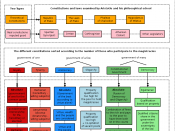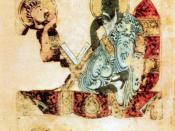"Aristotle's notion of voluntary and involuntary. If we excepted this in today's society, how will this change the way we look at morals."ÃÂ Aristotle notion and discussion of voluntary and involuntary is at its simplest form, the recognition of man's ability to make choice. Whether it is by force or by ignorance men are able to choose and must be held accountable for the decisions made.
When Aristotle first speaks of involuntary and voluntary he says that if a man is forced to do something morally wrong then it is an involuntary action. He also says that if man is ignorant to the situation then that too is involuntary. But as he describes, there are varying degrees of force and ignorance.
If we examine the nature of force to try to come to absolute about voluntary or involuntary action we see that there are many variables. Aristotle says that without qualification actions are called forced upon when the cause is in the external circumstance and the agent contributes nothing.
However, Aristotle also says that each situation has particular circumstances that should taken into account. For example, if someone was on the border of financial ruin and was about to lose all his possessions, creditors could request that he sale his home to pay down debt. If the same man chooses not to sale his home but to rob a bank and in the process kills a clerk, we can not say that he was forced to do so and should not be punished. Furthermore, it is absurd to say that this force made him involuntarily kill. We as humans are able to reason and have the capacity to set moral limits.
If we then look at Aristotle's notion of voluntary and involuntary in regards to ignorance we must...


